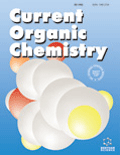
CURRENT ORGANIC CHEMISTRY
Scope & Guideline
Fostering Excellence in Organic Chemistry Scholarship
Introduction
Aims and Scopes
- Organic Synthesis Methodologies:
The journal explores diverse synthetic methodologies, including but not limited to multicomponent reactions, organocatalysis, and microwave-assisted synthesis, aimed at enhancing efficiency and sustainability in organic synthesis. - Green Chemistry Practices:
A significant emphasis is placed on environmentally friendly practices, such as green synthesis, the use of ionic liquids, and biocatalysis, promoting sustainable chemistry that minimizes waste and utilizes renewable resources. - Biological Applications of Organic Compounds:
Research papers often discuss the biological activities of synthesized compounds, including anticancer, antimicrobial, and anti-inflammatory properties, linking organic chemistry with medicinal applications. - Catalysis and Nanomaterials:
The journal covers advancements in catalytic processes, including the development of novel heterogeneous and homogeneous catalysts, as well as the application of nanomaterials in facilitating organic transformations. - Heterocyclic Chemistry:
A core focus is on the synthesis and applications of heterocycles, which are crucial in drug discovery and development, with extensive research on their biological activities and therapeutic potentials.
Trending and Emerging
- Multicomponent Reactions (MCRs):
There is a growing emphasis on multicomponent reactions, which allow for the simultaneous formation of multiple bonds and complex structures in a single step, making synthesis more efficient and versatile. - Sustainable and Green Synthesis:
Research highlighting sustainable practices, such as the use of biodegradable solvents and renewable resources, has gained momentum, reflecting a significant trend in the organic chemistry community towards environmentally friendly methodologies. - Application of Nanomaterials in Synthesis:
The integration of nanomaterials in organic synthesis is increasingly prominent, showcasing their role as catalysts and facilitators in enhancing reaction efficiencies and selectivities. - Computational Chemistry and Molecular Docking:
There is a rising interest in computational approaches to support synthetic work, particularly in molecular docking studies that predict the biological activity of compounds, enhancing the drug discovery process. - Biocatalysis and Green Catalysts:
The use of enzymes and biocatalysts in organic synthesis is on the rise, reflecting a shift towards more sustainable and specific methodologies that reduce environmental impact.
Declining or Waning
- Traditional Synthetic Methods:
There has been a noticeable decrease in papers focused on conventional synthetic methodologies, as researchers increasingly pivot towards more innovative and sustainable approaches to organic synthesis. - Non-Green Alternatives:
The emphasis on non-green synthetic methodologies has decreased, reflecting a broader trend in the field towards sustainability and environmental responsibility in organic chemistry. - Single-Step Syntheses:
Research focusing solely on single-step reactions has declined, as the field moves towards more complex multicomponent reactions that provide more efficient pathways to target compounds. - Basic Research on Established Compounds:
There is less focus on the synthesis of well-established compounds without novel applications or modifications, indicating a shift towards more innovative and application-driven research.
Similar Journals
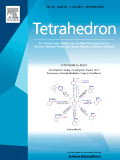
TETRAHEDRON
Exploring the molecular universe since 1957.TETRAHEDRON, published by Pergamon-Elsevier Science Ltd, is a leading peer-reviewed journal that has been pivotal in advancing the fields of Biochemistry, Drug Discovery, and Organic Chemistry since its inception in 1957. With an ISSN of 0040-4020 and an E-ISSN of 1464-5416, this journal provides a platform for the dissemination of cutting-edge research and innovative methodologies that contribute significantly to the scientific community. Recognized for its rigorous editorial standards, TETRAHEDRON has been categorized in the Q3 quartile for 2023 across its relevant fields, reflecting its solid impact within the scientific sphere. Despite the current absence of Open Access options, the journal continues to engage a diverse readership, offering invaluable insights and advancements that fuel both academic and industrial applications. With an ongoing commitment to excellence, TETRAHEDRON remains an essential resource for researchers, professionals, and students aiming to stay at the forefront of chemistry and biochemistry research.
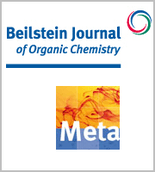
Beilstein Journal of Organic Chemistry
Pioneering cutting-edge research in organic chemistry.The Beilstein Journal of Organic Chemistry, published by the renowned BEILSTEIN-INSTITUT, stands as a pivotal platform for advancing the field of organic chemistry since its inception in 2005. With its commitment to Open Access publishing, this journal enables global readership and collaboration, fostering the dissemination of high-quality research. Operating from Germany, the journal has carved out a significant reputation, currently holding a Q2 ranking in the Organic Chemistry category, with impressive Scopus rankings placing it at #91 out of 211 in the field, achieving a 57th percentile. The Beilstein Journal is dedicated to publishing cutting-edge findings that span the breadth of organic chemistry, including synthetic methodologies, catalysis, and material sciences, making it an essential resource for researchers, professionals, and students looking to stay at the forefront of organic chemistry advancements. With a vision to enhance collaboration and knowledge sharing within the scientific community, the journal plays a vital role in shaping the future of organic chemistry research.
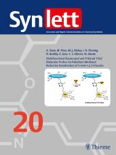
SYNLETT
Catalyzing Discoveries in Organic SynthesisSYNLETT is a prominent academic journal dedicated to the field of Organic Chemistry, published by GEORG THIEME VERLAG KG. Since its inception in 1989, the journal has played a critical role in advancing the understanding of synthetic methodologies and organic compounds, offering a platform for innovative research and discoveries. With an ISSN of 0936-5214 and an E-ISSN of 1437-2096, SYNLETT is well-regarded in the academic community, presently positioned in the Q3 quartile for Organic Chemistry according to the 2023 category rankings. The journal is particularly valuable for researchers and professionals seeking insights into contemporary organic synthesis methods and their applications. Although it does not operate under an Open Access model, it remains a crucial resource within the field, contributing to significant advancements and collaborations globally. For those engaged in organic synthesis, SYNLETT not only encapsulates cutting-edge research but also inspires innovation in the discipline.

RUSSIAN JOURNAL OF ORGANIC CHEMISTRY
Illuminating the Path of Organic Chemistry ResearchRUSSIAN JOURNAL OF ORGANIC CHEMISTRY, published by MAIK NAUKA/INTERPERIODICA/SPRINGER, stands as a pivotal resource in the realm of organic chemistry, catering to an audience of researchers, professionals, and students keen on the latest advancements in this dynamic field. With an ISSN of 1070-4280 and E-ISSN of 1608-3393, this journal has been a fixture in academic literature since its inception in 1996 and continues to play a significant role as it converges towards 2024. Despite currently holding a Q4 ranking in organic chemistry and a modest placement in the Scopus ranks, the journal offers valuable insights and contributions that reflect the ongoing research and trends within the discipline. Though it does not operate under an open access model, the journal provides essential studies and reviews that enhance scientific dialogue and innovation. Located in the United States, the journal supports the advancement of organic chemistry, fostering a deeper understanding of complex chemical interactions and methodologies.

JOURNAL OF HETEROCYCLIC CHEMISTRY
Navigating the World of Organic InnovationsJournal of Heterocyclic Chemistry, published by Wiley, stands as a key resource in the field of organic chemistry, offering in-depth research articles and insights spanning from 1966 to 2024. With its strong Scopus ranking of #83 out of 211 in the Organic Chemistry category, placing it in the 60th percentile, the journal maintains its significance and relevance within the academic community. Although it does not currently offer open access options, it provides extensive coverage of heterocyclic compounds, which are vital to various applications in pharmaceuticals and material sciences. The journal's commitment to high-quality research is further reflected in its classification as Q3 in the 2023 quartiles for Organic Chemistry. Researchers, professionals, and students alike will find valuable contributions to the intricate studies of heterocycles, enhancing their understanding and exploration of this fascinating area of chemistry.

EUROPEAN JOURNAL OF ORGANIC CHEMISTRY
Advancing the Frontiers of Organic ChemistryThe EUROPEAN JOURNAL OF ORGANIC CHEMISTRY (ISSN: 1434-193X; E-ISSN: 1099-0690), published by WILEY-V C H VERLAG GMBH in Germany, stands as a crucial platform for disseminating innovative research in the fields of organic, physical, and theoretical chemistry. With its inception dating back to 1998 and converging expertise until 2024, this esteemed journal has achieved a notable reputation, earning a Q2 rank in both Organic Chemistry and Physical and Theoretical Chemistry categories as of 2023, indicating its vital contribution to the academic community. Researchers and professionals will benefit from its rigorous peer-reviewed articles, which foster advancement in chemical sciences, while students can leverage its wealth of knowledge to enhance their learning. Although currently not an open-access journal, the content produced is invaluable for those looking to stay at the forefront of chemical research.
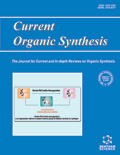
CURRENT ORGANIC SYNTHESIS
Transforming Ideas into Organic SolutionsCURRENT ORGANIC SYNTHESIS, published by Bentham Science Publishers Ltd, is a leading journal in the field of organic chemistry and biochemistry that serves as a vital platform for researchers and professionals advancing the synthesis of organic compounds. With an ISSN of 1570-1794 and an E-ISSN of 1875-6271, it boasts a significant impact within its category, ranked in the Q3 quartile for both biochemistry and organic chemistry as of 2023. The journal covers innovative research and reviews that enhance our understanding of organic synthesis methodologies, showcasing contributions that advance the field. Operating from Sharjah, United Arab Emirates, CURRENT ORGANIC SYNTHESIS has evolved since its inception in 2005, providing access to a wealth of information essential for students, professionals, and researchers alike. While it currently does not offer open access, the journal continues to maintain a strong community of scholars dedicated to fostering dialogue and innovation in the organic sciences.
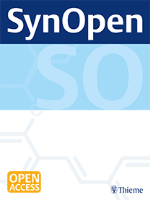
SynOpen
Empowering Open Access for Scientific ProgressSynOpen is an esteemed open-access journal published by GEORG THIEME VERLAG KG, based in Germany, dedicated to advancing the fields of Biomaterials, Catalysis, Materials Science, and Organic Chemistry. Since its inception in 2017, the journal has established itself as a vital platform for researchers wishing to disseminate their findings in a rapidly evolving scientific landscape, earning a commendable Q2 ranking in Materials Science (miscellaneous) and Q3 in other key categories for 2023. With an increasing impact on its disciplines, SynOpen aims to foster interdisciplinary collaboration and innovation by providing unrestricted access to high-quality research, thus promoting a broader reach and visibility for authors. Scholars, professionals, and students alike can benefit from the comprehensive range of topics covered, as the journal's commitment to presenting cutting-edge studies and methodologies positions it as a crucial resource for contemporary scientific inquiry.

Asian Journal of Organic Chemistry
Exploring the depths of organic chemistry excellence.Asian Journal of Organic Chemistry, published by WILEY-V C H VERLAG GMBH, stands as a pivotal platform in the realm of organic chemistry, catering to researchers and professionals eager to share their contributions to the field. With an ISSN of 2193-5807 and E-ISSN of 2193-5815, this journal spans a commendable convergence from 2012 to 2024, featuring a notable impact factor highlighted by its Q2 ranking in the 2023 Organic Chemistry category. Positioned at rank #94 out of 211 in Scopus, the journal emphasizes the importance of quality research and innovation in organic chemistry. The lack of open access enhances the journal's selectivity, ensuring only the most rigorous and impactful studies are published. Serving as a vital resource for scholars, students, and practitioners alike, the Asian Journal of Organic Chemistry fosters the dissemination of knowledge, advances academic dialogue, and reinforces the pivotal role of organic chemistry in scientific advancement.

INDIAN JOURNAL OF HETEROCYCLIC CHEMISTRY
Pioneering Research in Biochemistry and BeyondINDIAN JOURNAL OF HETEROCYCLIC CHEMISTRY, published by CONNECT JOURNALS, is a vital resource in the fields of organic chemistry and biochemistry, aiming to advance research and promote innovation within the realm of heterocyclic compounds. Established in 1996, this journal has successfully converged into an influential publication with a commitment to disseminating high-quality, peer-reviewed research articles that enhance the understanding of heterocyclic chemistry applications. Although it currently holds a Q4 quartile ranking in both biochemistry and organic chemistry according to the 2023 categorizations, its broader contributions to the scientific community should not be underestimated, as it seeks to support the ongoing dialogue among researchers, professionals, and students. The journal operates from Ghaziabad, India, providing open access to its publications, thereby fostering a collaborative and informative environment for its international readership. With an ISSN of 0971-1627 and a special focus on contemporary challenges and developments in the field, the INDIAN JOURNAL OF HETEROCYCLIC CHEMISTRY is poised to make a significant impact as it continues to evolve through 2024 and beyond.